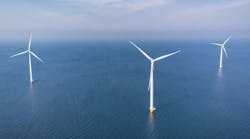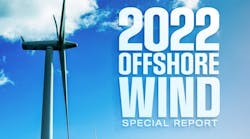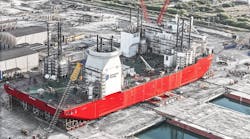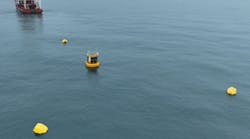Editor's note: This story first appeared in the March-April 2023 issue of Offshore magazine's Energy Transformation Strategies Special Report.
By Alireza Maheri and Eddy Wifa, Centre for Energy Transition, University of Aberdeen
The energy transition or the move to net-zero, which essentially seeks to balance the twin challenges of energy security and climate change, is without a doubt very challenging for a variety of reasons. The situation is further complicated by market forces, energy crises and other geopolitical issues. Perhaps such difficulty was the inspiration behind the recent cabinet reshuffling and the creation of the Department for Energy Security and Net-Zero.
While the oil and gas industry has made and continues to make meaningful contributions to the global energy mix, offshore wind energy and other renewable energy sources are expected to balance the energy trilemma. Significant progress has been made in the deployment of offshore wind energy in particular; however, the challenges remain. This article provides some useful insights of these challenges as technical and regulatory barriers to the energy transition.
The pathway to offshore oil and gas transition to green energy also includes the decarbonization of late-life operation using renewable resources and then repurposing of offshore assets for producing green energy or energy carrier products such as hydrogen and ammonia. The challenge is rather the development of a transition scenario, which leads to an optimum timeline for integration and then expansion of renewables. It is in this sense that offshore wind is considered.
The UK has significant offshore wind and wave resources, allowing it to take advantage of the opportunities for transition from offshore oil and gas to offshore renewable energy. As a result of recent technological advancements and investments, offshore wind has achieved significant cost reductions with a levelized cost of energy (LCOE) competitive with fossil fuels.
However, transition from offshore oil and gas to offshore renewable energy, faces other challenges besides the cost competitiveness, such as uncertainties of renewable resources, hence, reliability of the power supply. This leads to broader energy security concerns particularly if used as the main source of energy.
Other challenges include integration to the current grid infrastructures due to limited grid capacity, as well as grid instability caused by the integration of large scale intermittent renewable power to the grid.
Energy storage systems
Resolving the above challenges would require integrating large-scale energy storage systems, either in the form of storage hubs or distributed and decentralized storage systems. This is a solution that can address the reliability and energy security challenge. Battery and hydrogen as an energy carrier are the most promising storage technologies. Hydrogen can be stored in large quantities, hence benefits from the economy of scale. Compared to batteries, however, hydrogen has a much lower roundtrip efficiency, and there are technological challenges in distribution and storage in large quantities. Battery is a rapid-ramp technology that can address the grid stability challenge. Hydrogen has the potential of addressing the grid capacity challenge.
For instance, only 40% of the planned ScotWind offshore wind capacity is considered in the national grid’s design. A large-scale hydrogen production site powered by ScotWind paves the footpath for full utilization of offshore wind energy with minimal investment on the current grid infrastructure. Rapid-ramp storage (e.g., battery) or production technologies can improve the grid stability by scaling up and down the load rapidly.
Other offshore renewable energy sources are equally viable. Compared to offshore wind, wave and tidal energy resources are more predictable. Once integrated into the whole energy system in large scales, grid stability issues are less relevant and the whole energy system can be balanced with smaller utility scale energy storage. On the other hand, these technologies are less mature technologies and have higher LCOE. Therefore, significant investment is needed to make them as cost effective as offshore wind.
Policy and regulations
From a governance and regulatory perspective, there are a variety of issues that must be considered as the industry seeks to scale and maximize offshore wind energy resources. For marine planning and ecological governance, issues seek to avoid conflict with multiple sea users and transition issues seek to balance the benefits and burdens of transition. While government and stakeholders are aware of these challenges, as seen in the recently released Scottish Energy Transition Strategy and Just Transition Plan, offshore oil and gas workers remain less satisfied as there are implementation challenges.
If offshore wind energy is expected to be the panacea to the energy trilemma, then the industry must consider the challenges of skills shortage and the impact on worker safety. Research at the Aberdeen University Centre for Energy Law suggests that the offshore wind energy industry should be regulated using a safety case as is being used in analogous industries like offshore oil and gas. Recent developments and alarm bells have demonstrated the need for a reconsideration of the safety regime for offshore wind energy.
Without doubt, there is a growing realization that the energy transition is nothing like flicking a switch and is indeed more complicated than many expected. The situation is not made any easier by the global energy crisis, the COVID-19 pandemic and other geopolitical issues. In the UK, there is a lack of synergy and consistency in government’s approach, particularly between Westminster and Holyrood. Nevertheless, between scarce resources and political will, one can only remain optimistic.
About the authors:
Alireza Maheri is a reader at the School of Engineering at University of Aberdeen, with a research focus on the energy transition.
Eddy Wifa is an energy law lecturer at the School of Law, University of Aberdeen, with particular research interest in offshore energy risk regulation and governance.









